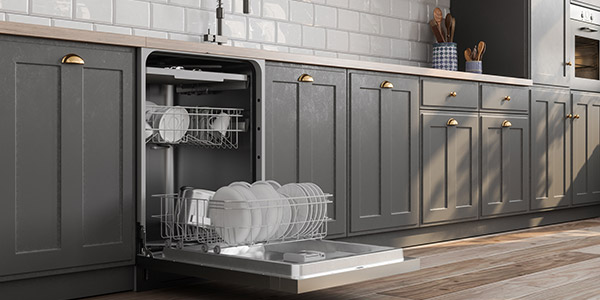Homebuyers
Is an Extended Warranty on Your New Appliances Worth It?
January 7, 2016
After purchasing a house, many new homeowners are excited to begin filling it with furniture, decorations, and, of course, appliances. Refrigerators, washing machines, dishwashers, heating, ventilation, air conditioning systems, and other major appliances are heavily relied upon by many people today. They are important, exciting, and expensive purchases; a lot of thought goes into each one.
Since they are so expensive, yet so essential, many buyers worry about the lifetime of their new appliance. They want it to last as long as possible. Repairs and replacements are costly and time-consuming.
This is where warranties come in. Most appliances, electronics, and other major purchases include a manufacturer's warranty, which typically lasts three to 12 months. They are called into action if the item breaks within that timeframe, offering free or discounted repairs or replacements.
How Long It Takes to Break
After the initial service guarantee ends, the protection is gone. Extended warranties typically last longer than the built-in warranty. If the product breaks down 14 months after purchase, the manufacturer's warranty will no longer be valid, but an extended warranty would be. To many people, it seems logical to pay an extra 10 or 20 percent for long-term reassurance that their new purchase will be with them for at least several years.
However, this usually isn't the case. Realtor.com explained that opting into an extended warranty is a common way new homeowners waste money. This is because many times, protection past that first year is rarely needed.
According to Consumer Reports, if an appliance is going to require repairs, it will usually happen within the time the manufacturer's warranty is applicable. After that, most appliances are fairly reliable. WiseBread explains that many large home appliances, such as refrigerators and stoves, will last between 10 and 15 years. Extended warranties generally only last between one and five years after the initial warranty goes out of effect.
In a survey by Consumer Reports, only 10 percent of repairs done on products were covered under an extended warranty. Plus, 77 percent of people didn't save much or any money by paying for the warranty, as the repairs would have cost them a similar amount.
Satisfaction Not Guaranteed
Even if the extended warranty is needed, chances are the repairs wouldn't have cost much more than the warranty itself. Consumer Reports found the difference is usually about $16.
Warranty repairs are usually less efficient than those paid for out-of-pocket. More than one-fifth of repairs done under the warranty needed to be repeated because they weren't done correctly, compared to 12 percent for those done out-of-pocket. Furthermore, 23 percent of repairs took two or more weeks to be completed under the warranty. Repairs done without a warranty were more likely to take place sooner.
According to the U.S. & World News Report, extended warranties can be particular about what repairs they will service. There may be certain stipulations about what types of damages aren't covered. Sometimes, if maintenance procedures aren't followed exactly, the warranty doesn't qualify.
Why People Buy
A Consumer Reports survey found that the majority of major appliance sales were followed up immediately with a pitch to buy an extended warranty. Customers therefore often face the decision the purchase in a limited time frame and feel pressured to choose fast. The survey found that most salespeople heavily promote the extended warranty because it boosts their commission on the sale.
U.S. News & World Report explains that the decision doesn't always have to be made in the moment. There are cases when an extended warranty can be chosen after the purchase is made. Buyers should inquire about this option before deciding whether they want to pay for the extended warranty.
Rajiv Sinha, a marketing professor at Arizona State University told U.S. & World News that many people buy an extended warranty based on emotion rather than logic. They think about what would happen if the item breaks after the manufacturer's warranty ends. The thought of needing to repair the item after the warranty ends persuades them to buy the extended warranty because they would be embarrassed if they had a chance to save money, but didn't.
Alternative Options
Though extended warranties aren't always worth the cost, it is still a good idea to have a plan in place should the appliance break.
U.S. & World News Report explains many stores have a 30-day return policy, which will come in handy should the product break in the first month. In this case, the manufacturer may help with repairs or replacements of products that break unusually quickly, even if there isn't a warranty, according to Consumer Reports.
Some cash-back credit cards offer protection that extends the length of the original warranty for free, according to U.S. & World News Report.
Putting away money that would have gone toward the cost of the warranty is a good way to save money. If the repairs are needed, the money will be set aside, but if the appliance works well throughout its lifespan, that money can be saved for something else, such as home repairs.
Of course, there are times when an extended warranty makes sense. Used items often fall under this category, according to U.S. & World News Report. This is because used products tend to be more prone to failure than new ones, making it more likely the extended warranty will be used.
New homeowners typically need to make several major appliance purchases in a short period. The extended warranties on these items can add up quickly, but it is important to keep in mind that they aren't always necessary. When deciding to purchase an extended warranty, it comes down to the consumer's best judgment.





 Smart Moves Start Here.
Smart Moves Start Here.